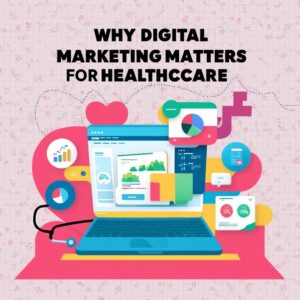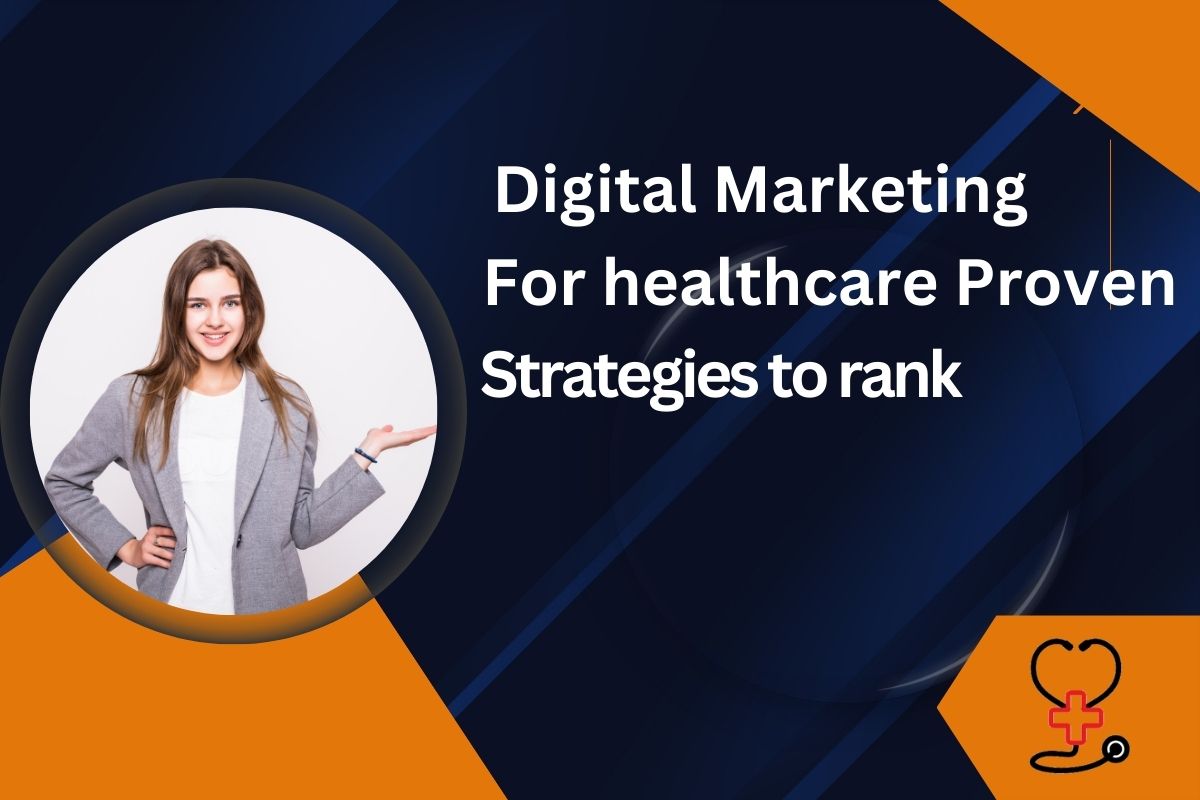In today’s digital-first world, healthcare providers—whether they are doctors, hospitals, clinics, or wellness centers—must adapt to changing patient behaviors. With the majority of people using the internet to search for health information and services, digital marketing for healthcare has become essential. A strong online presence is no longer optional but a necessity. To effectively engage with patients and grow their practice, healthcare professionals need to understand how to implement proven digital marketing strategies that drive results.
Why Digital Marketing Matters for Healthcare

Digital marketing in healthcare serves as the backbone of a successful patient acquisition strategy. Patients are increasingly using search engines, social media, and websites to research health conditions, look for doctors, and book appointments. According to recent studies, nearly 77% of patients use the internet to search for health-related information. This shows the importance of a robust digital presence for healthcare providers.
Moreover, the digital marketing landscape is continually evolving, so staying up-to-date with the latest strategies can be overwhelming. However, with the right approach, digital marketing for doctors and healthcare businesses can lead to measurable outcomes such as increased visibility, more leads, and better patient relationships.
Let’s dive into the top digital marketing strategies that can help healthcare providers rank higher and achieve success online.
Top Digital Marketing Strategies for Healthcare
1. Search Engine Optimization (SEO) for Healthcare Websites
One of the most effective digital marketing strategies is SEO (Search Engine Optimization). SEO helps your website rank higher in search engine results, making it easier for potential patients to find you. The key components of healthcare SEO include:
- Keyword Research: Find out what health-related terms and phrases patients are searching for online. Use tools like Google Keyword Planner, SEMrush, or Ahrefs to identify high-traffic keywords for your healthcare practice. For instance, a pediatrician might target phrases like “best pediatrician near me” or “pediatric care in [location].”
- On-Page Optimization: Optimize your website content by integrating target keywords into the page titles, headers (H1, H2), meta descriptions, and URLs. Be sure to use relevant medical terminology while keeping your content easy to understand.
- Content Marketing: Write valuable content around frequently asked questions, treatments, and medical procedures. Blog posts, FAQ pages, and informative articles not only help your SEO but also position you as an authority in your field. This approach can lead to more website traffic and increased engagement from potential patients.
- Local SEO: Many healthcare practices rely on local patients, so optimizing for local search is critical. Make sure to claim and optimize your Google My Business listing, ensure NAP (Name, Address, Phone) consistency across online platforms, and gather patient reviews to increase trustworthiness and local visibility.
“In healthcare, visibility is directly correlated with trust. People want to feel confident about the doctors and practices they find online, and SEO can significantly boost that credibility.” — Dr. John Smith, Pediatric Specialist
2. Pay-Per-Click (PPC) Advertising

While SEO is a long-term strategy, PPC advertising delivers immediate results. By using platforms like Google Ads, healthcare providers can create targeted ads that appear at the top of search results. Here’s how PPC works for healthcare businesses:
- Target Specific Keywords: Using Google Ads, you can create ads that target high-intent search queries, such as “emergency dentist near me” or “best dermatologist in [city].”
- Geo-targeting: Since healthcare services are location-specific, PPC allows you to target ads to people in specific geographic areas, ensuring that you only reach individuals who are close to your practice.
- Ad Extensions: You can include additional information in your ads, such as your phone number, location, and specific services. This can increase the visibility and conversion rate of your ads.
- Remarketing: With remarketing ads, you can target patients who have visited your website but didn’t make an appointment. This keeps your practice top-of-mind and encourages them to come back.
“PPC can be a game-changer for healthcare providers looking to attract more patients quickly. It’s all about delivering the right message to the right audience at the right time.” — Sarah James, Digital Marketing Consultant
3. Social Media Marketing

Social media is one of the most powerful tools for digital marketing in healthcare. It allows doctors and healthcare providers to build strong relationships with current and potential patients. Here are key elements of an effective healthcare social media strategy:
- Platform Selection: Focus on platforms that align with your target audience. For instance, Instagram and Facebook work well for patient engagement, while LinkedIn may be better for networking with other healthcare professionals.
- Content Creation: Share educational and relevant content, including health tips, patient success stories, behind-the-scenes glimpses of your practice, and updates about services or events. These posts help humanize your practice and build trust.
- Engagement: Respond to comments, direct messages, and patient inquiries. Social media is a two-way communication channel, so engaging with patients helps build a loyal online community.
- Paid Social Media Ads: Platforms like Facebook and Instagram also offer paid advertising options, which can be used to target specific demographics (e.g., age, location, interests) to promote your healthcare services.
“Social media is an extension of your practice. It’s where patients get to know the human side of your healthcare brand.” — Dr. Emily Green, Dentist
4. Email Marketing

Email marketing is a highly effective and cost-efficient way to nurture existing patients and attract new ones. Here’s how healthcare providers can leverage email marketing:
- Newsletters: Create informative newsletters with updates about your services, health tips, and patient success stories. Keep your content valuable and relevant to keep patients engaged.
- Personalized Emails: Segment your email list based on patient needs, age groups, or previous treatments. Personalization increases the likelihood of engagement and conversions.
- Appointment Reminders: Automate appointment reminders to reduce no-shows. You can send reminders via email or text message, along with follow-up emails after visits to keep patients informed.
- Automated Drip Campaigns: Create a series of emails that educate potential patients on common health issues and how your practice can help. Over time, this builds trust and encourages conversions.
“A well-timed, well-targeted email can be a healthcare provider’s best friend when it comes to retention and re-engagement.” — Mark Thompson, Email Marketing Specialist
5. Video Marketing

Video marketing is an increasingly popular and effective way for healthcare professionals to connect with their audience. It’s more engaging and personal than text-based content. Here’s how to use video effectively:
- Patient Testimonials: Showcase happy patients sharing their experiences with your practice. This helps build social proof and trust.
- Procedure Demonstrations: For specialized services, consider creating video content explaining procedures or treatments in an easy-to-understand way.
- Live Q&A Sessions: Hosting live sessions on platforms like Facebook or YouTube can allow patients to interact with you in real-time, ask questions, and learn more about your expertise.
“Video content allows healthcare providers to humanize their practice. Patients want to see the faces behind the services they’re considering.” — Jessica Taylor, Healthcare Content Strategist
6. Online Reputation Management

For healthcare providers, a strong online reputation is crucial. Patient reviews and testimonials play a significant role in decision-making. Managing your reputation involves:
- Encouraging Reviews: Ask happy patients to leave reviews on Google, Yelp, or your website. Positive reviews build trust and improve your SEO.
- Responding to Feedback: Respond to both positive and negative reviews. Show potential patients that you value feedback and are committed to providing excellent care.
- Addressing Negative Reviews: If you receive negative feedback, handle it professionally. Offering a solution or an explanation shows that you take patient concerns seriously.
“In healthcare, reviews can be your best advertisement or your worst nightmare. Proactively managing your reputation can lead to more patients choosing your practice.” — Linda Adams, Online Reputation Expert
Conclusion: Leveraging Digital Marketing for Healthcare Success

Digital marketing strategies are no longer just an option for healthcare providers—they are a necessity in a competitive, digital world. Whether it’s through SEO, PPC, social media, or email marketing, healthcare practices need to embrace these digital marketing tactics to rank higher online and attract more patients.
To sum up the proven strategies:
- Invest in SEO to improve your organic search rankings.
- Use PPC ads to drive immediate traffic to your website.
- Engage with patients on social media to build brand loyalty.
- Leverage email marketing to stay in touch and drive conversions.
- Create compelling video content to enhance engagement.
- Manage your online reputation to build trust and credibility.
By consistently implementing these strategies, healthcare providers can stay ahead of the competition and create a sustainable, successful online presence.
